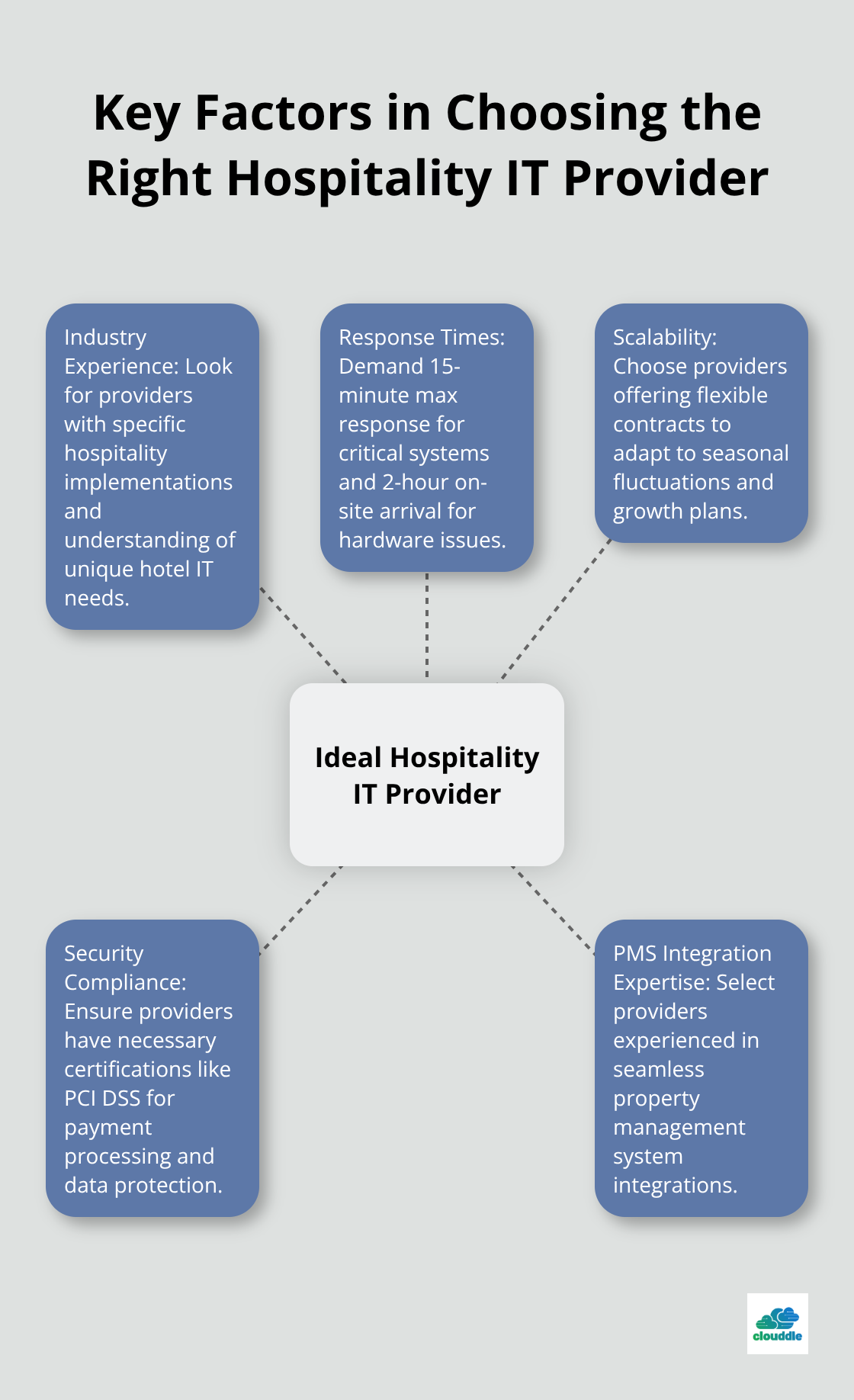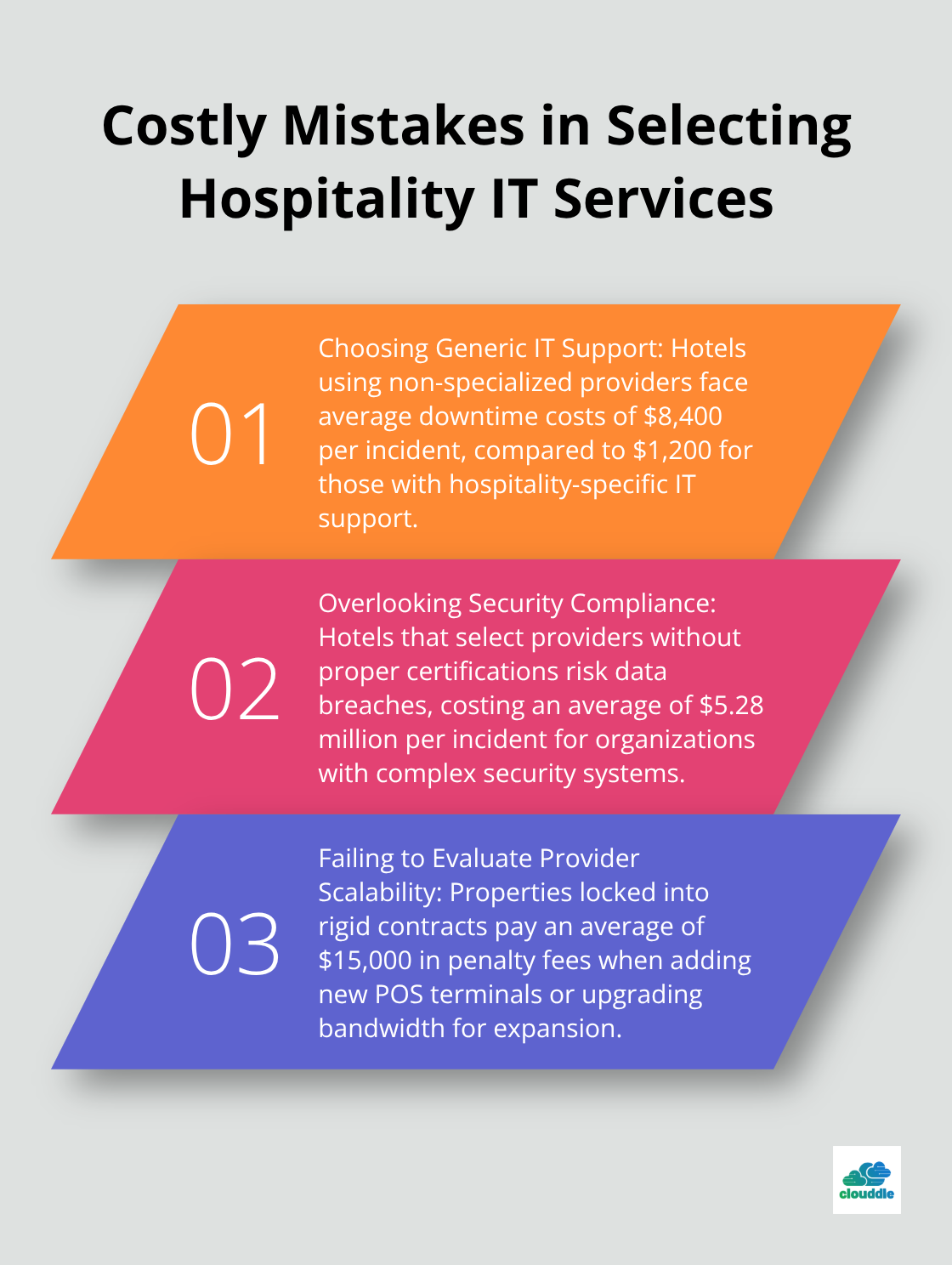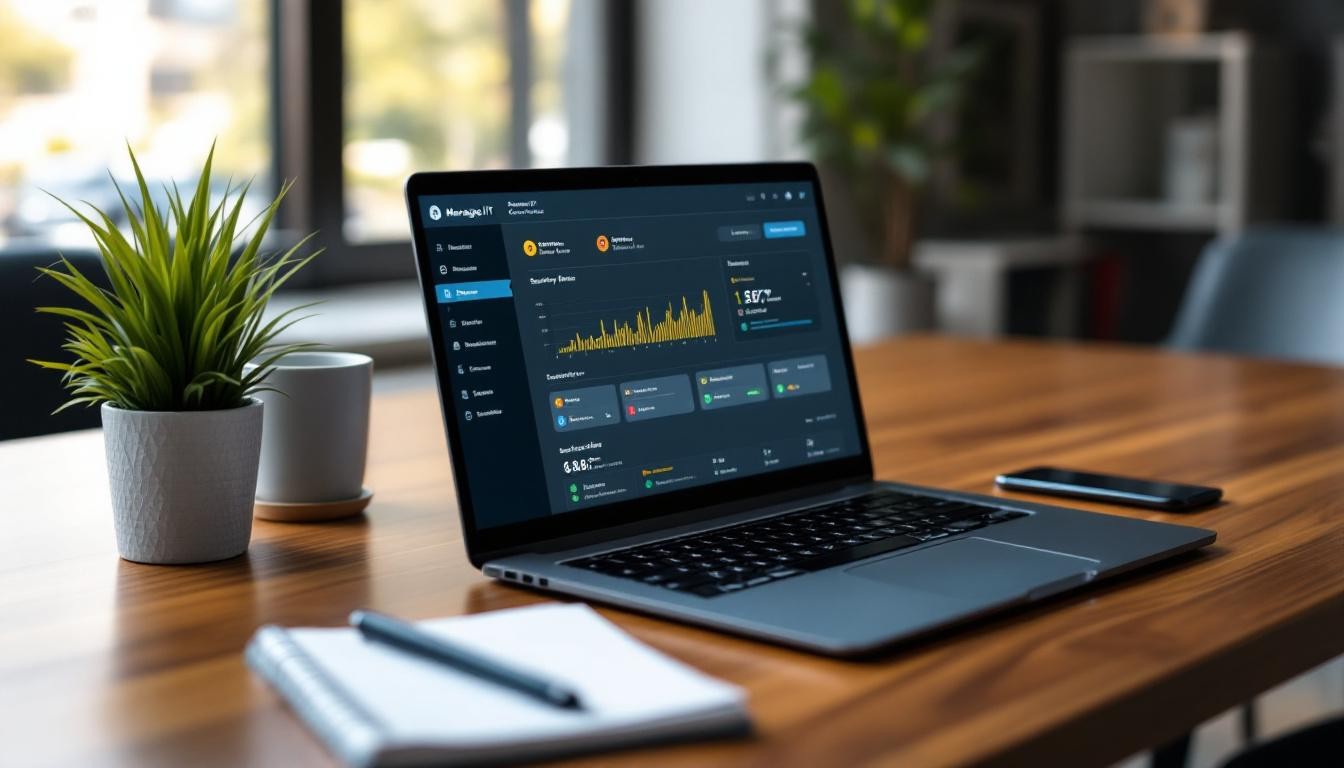Hotels and restaurants face unique IT challenges that generic tech support simply can’t handle. From guest Wi-Fi demands to POS system failures during peak hours, hospitality businesses need specialized solutions.
We at Clouddle understand that selecting the right managed IT services for hospitality requires careful evaluation of industry-specific expertise and support capabilities.
What Core IT Features Does Your Hotel Actually Need
Hospitality operations demand four non-negotiable IT capabilities that separate successful properties from those that struggle with constant technical issues. Round-the-clock network monitoring stands as the foundation because hotel systems never sleep – guest check-ins happen at 2 AM, room service orders come through at midnight, and POS terminals must process payments during peak breakfast rushes. According to industry data, hotels lose an average of $5,600 per minute during unplanned downtime, which makes proactive monitoring essential rather than optional.

Guest Wi-Fi That Actually Works
Your guest Wi-Fi network requires enterprise-grade management with bandwidth allocation per room and automatic threat detection. Properties report that guest wi-fi speed has a strong correlation with guest satisfaction scores, yet many hotels still treat it as an afterthought. Professional Wi-Fi management includes segmented networks that separate guest traffic from business operations, which prevents security breaches while maintaining performance standards. Load balancing across multiple access points prevents the common scenario where conference attendees crash your entire network during events.
POS Integration Without the Headaches
Restaurant and bar POS systems need seamless integration with property management software, inventory tracking, and accounting platforms. Modern hospitality operations run on real-time data synchronization – when your restaurant POS doesn’t communicate with your hotel management system, you lose revenue tracking accuracy and create reconciliation nightmares. Professional IT providers configure automatic failover systems that switch to backup terminals within seconds, which prevents lost sales during hardware failures. Payment processing compliance requirements (like PCI DSS) demand specialized knowledge that generic IT support lacks.
Data Protection That Goes Beyond Basic Backups
Hospitality businesses handle sensitive guest information, credit card data, and operational records that require sophisticated backup strategies. Simple cloud storage isn’t sufficient – you need automated daily backups with point-in-time recovery, encrypted data transmission, and geographically distributed storage locations. Recovery time objectives should target four hours maximum for critical systems, with one hour for POS and reservation platforms (testing backup systems quarterly prevents the devastating scenario of failed recovery attempts during actual emergencies).
These technical requirements form the foundation for evaluating potential managed IT service providers, but the provider’s industry expertise and service commitments matter just as much as their technical capabilities.
How Do You Pick the Right Hospitality IT Provider
Managed IT providers with genuine hospitality experience separate properties that thrive from those that struggle with constant technical issues. Look for providers who can demonstrate specific hospitality implementations – not just generic business IT support. The best providers understand that hotel POS systems require different failover strategies than retail environments, and they know that guest Wi-Fi demands bandwidth management techniques that office networks never need.
Ask potential providers about their experience with property management system integrations, payment processing compliance, and guest data protection requirements. Providers without hospitality-specific certifications or case studies will cost you more in downtime and guest dissatisfaction than any savings on monthly fees.
Response Times That Match Your Business Hours
Service level agreements must reflect hospitality operations that never stop. Standard business-hour support arrangements fail catastrophically when your POS system crashes during Saturday night dinner service or when guest Wi-Fi fails during a wedding reception.
Demand response times of 15 minutes maximum for critical system failures, with on-site technician arrival within two hours for hardware issues. The CRN 2024 MSP 500 List shows that top-performing managed service providers offer tiered response systems where reservation platforms and payment processing receive immediate attention while administrative systems get four-hour response windows.
Contract terms should specify financial penalties when providers miss response commitments, because vague language about best efforts won’t help when you’re losing $5,600 per minute during peak occupancy periods.
Scalability That Adapts to Your Growth
Seasonal occupancy fluctuations, event bookings, and expansion plans demand providers who can adjust bandwidth, add access points, and integrate new POS terminals without lengthy procurement processes. Hotels experience dramatic traffic spikes during conferences and wedding seasons.
Your provider should offer flexible contract terms that allow capacity adjustments without penalty fees or long-term commitments. Properties that lock into rigid service agreements often pay for unused capacity during slow seasons while struggling with inadequate support during busy periods.
Even the most experienced providers can fall short if they don’t understand the specific security and compliance requirements that hospitality businesses face daily.
What Hospitality IT Selection Mistakes Cost You the Most
Hotel operators who select managed IT services based solely on monthly pricing consistently face higher operational costs within six months. The hospitality industry experiences unique failure patterns where low-cost providers lack the specialized knowledge to handle PMS system crashes during peak check-in periods or payment processing failures during wedding receptions. Properties that choose generic IT support based on price alone report average downtime costs of $8,400 per incident compared to $1,200 for hotels that use hospitality-specialized providers, according to recent industry analysis.
Why Generic IT Support Fails Hotels
Standard business IT providers lack the specialized certifications required for hospitality operations, particularly PCI DSS compliance for payment processing and guest data protection protocols. Hotels that select providers without hospitality-specific experience face regulatory violations that average $12,000 in fines during compliance audits. Generic providers typically offer business-hour support that fails catastrophically when hotel systems crash during weekend events or holiday periods when occupancy peaks.

Properties that use non-specialized IT support experience 40% longer resolution times for critical system failures because technicians must learn hospitality software configurations during emergencies rather than have pre-configured solutions ready.
Security Compliance Gaps That Create Legal Risks
Hotels that overlook security and compliance standards face devastating consequences beyond technical failures. Properties that select providers without proper PCI DSS certifications expose themselves to data breaches that cost an average of $5.28 million per incident for organizations with high security system complexity. Non-compliant providers often lack the encryption protocols and access controls that hospitality businesses need to protect guest credit card information and personal data. Hotels discover these gaps only during compliance audits or after security incidents occur, when remediation costs multiply exponentially.
Growth Plans That Backfire Without Proper Evaluation
Hotels that fail to evaluate provider scalability face expensive migration costs when they expand operations or add seasonal capacity. Properties locked into rigid contracts pay penalty fees that average $15,000 when they add new POS terminals or upgrade bandwidth for conference facilities. The most costly mistake involves hotels that select providers who cannot integrate new property management systems or expand Wi-Fi coverage without complete infrastructure replacement, which forces properties to restart their entire IT implementation process.
Final Thoughts
Hotels must evaluate four key areas when they select managed IT services for hospitality: 24/7 network monitoring capabilities, guest Wi-Fi management expertise, POS system integration experience, and comprehensive data backup solutions. Properties that choose hospitality-specific expertise over generic IT support avoid the ,400 average downtime costs that affect hotels with non-specialized providers. Hospitality IT specialists understand the unique demands of hotel operations, from PCI DSS compliance requirements to seasonal capacity fluctuations.
These providers deliver response times under 15 minutes for critical failures and maintain the specialized certifications that prevent costly regulatory violations (which average $12,000 per audit). The implementation process starts when you assess your current IT infrastructure and identify gaps in guest Wi-Fi performance, POS reliability, and data protection protocols. You should document your peak occupancy periods and seasonal requirements to evaluate provider scalability options accurately.
We at Clouddle offer managed IT services for hospitality that combine networking, security, and 24/7 support. Our hospitality-focused approach addresses the specific technical challenges that hotels face while we provide flexible contracts that adapt to your operational needs. Contact us to learn how we can support your property’s IT requirements.


